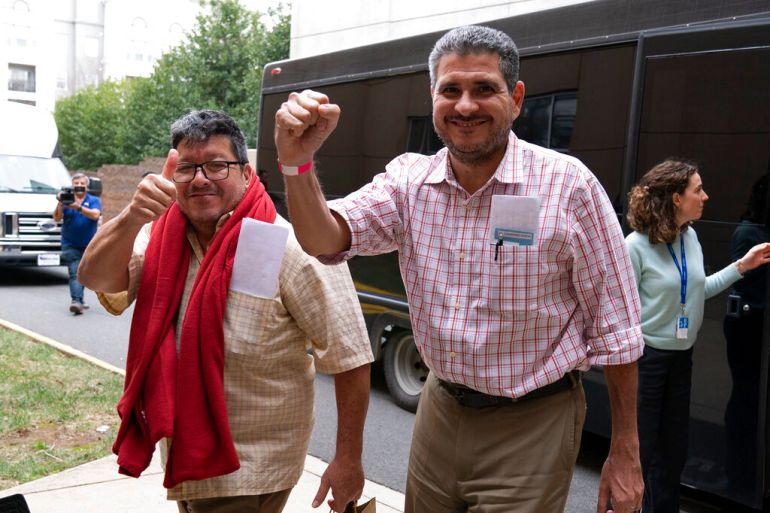US sanctions Nicaraguan judges who removed dissident citizenship
The sanctions come as the government of President Daniel Ortega faces ongoing allegations of silencing dissent.

The United States has announced sanctions against three Nicaraguan judges for their role in stripping hundreds of activists and political dissidents of their citizenship, as the Nicaraguan government faces allegations of stifling opposition.
In a press release on Wednesday, US Secretary of State Antony Blinken said that the judges had helped facilitate “government repression” and the removal of the citizenship of more than 300 Nicaraguans.
Keep reading
list of 3 itemsUN calls move to strip Nicaraguan dissidents’ citizenship illegal
US condemns Nicaragua’s imprisonment of outspoken bishop
“The United States is taking further action to hold accountable perpetrators of the Nicaraguan regime’s repressive actions,” Blinken said in a press statement.
Nicaragua’s government, led by Nicaraguan President Daniel Ortega and Vice President Rosario Murillo, has been criticised by the United Nations and human rights groups like Amnesty International for using the judiciary to target political opponents.
“We will continue to use available diplomatic and economic tools to promote accountability for the Ortega-Murillo regime’s abuses,” Blinken added.
Today, during the 5th anniversary of the Ortega-Murillo regime’s wave of violent repression, the United States sanctioned three Nicaraguan judges involved in stripping over 300 Nicaraguans of their citizenship, leaving many of these individuals stateless.
— Secretary Antony Blinken (@SecBlinken) April 19, 2023
In February, Nicaragua released 222 political prisoners, sending them into exile in the US. Lawmakers then voted to revoke their citizenship, threatening to render them stateless.
A week later, a Nicaraguan court also revoked the citizenship of 94 exiled dissidents in a move condemned as illegal by the UN refugee agency.
The sanctions target Nicaraguan judges Nadia Camila Tardencilla Rodriguez, Ernesto Leonel Rodriguez Mejia, and Octavio Ernesto Rothschuh Andino, whom Blinken called “directly responsible” for the controversial decision that had left “many of these individuals stateless”.
On Tuesday, Amnesty International released a report stating that the Ortega government has sought to consolidate power through a variety of means — including “excessive use of force, use of criminal laws to unjustly criminalize activists and dissidents, attacks on civil society and forced exile”.
The report was released on the fifth anniversary of nationwide protests in Nicaragua in 2018, when citizens took to the streets to demonstrate against austerity measures and social security cuts.
The government responded to those demonstrations with a lethal crackdown that killed hundreds of people.
The report states that, in the time since, the government has found ways to “expand and reinvent” patterns of repression and eliminate critical voices — including independent media, civil society groups and political opponents — from the public sphere.
The Nicaraguan government also cancelled its approval of the European Union’s ambassador to the country on Tuesday, following a statement in which the EU raised concerns about the rule of law in Nicaragua.